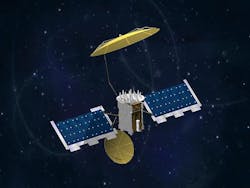Space Force picks Lockheed Martin and Boeing to begin project to upgrade MUOS mobile SATCOM system
LOS ANGELES AIR FORCE BASE, Calif. – U.S. Space Force needed upgrades to the U.S. military's Mobile User Objective System (MUOS) satellite communications (SATCOM) system. They found their solution from Lockheed Martin Corp. and the Boeing Co.
Officials of the U.S. Space Force's Space Systems Command at Los Angeles Air Force Base, Calif., announced separate $66 million contracts Thursday to Lockheed Martin Space Systems in Sunnyvale, Calif., and Boeing Defense, Space & Security in El Segundo, Calif., for Mobile User Objective System Service Life Extension (MUOS SLE) 1.
This phase-one contract provides for risk reduction and early design activities to reduce risk and uncertainty prior to entering MUOS SLE phase two to upgrade the SATCOM system.
The Mobile User Objective System (MUOS) is the U.S. military's narrowband military SATCOM system that supports a worldwide, multiservice population of ultra-high-frequency (UHF) users for reliable communications with the latest military SATCOM terminals.
MUOS adapts a commercial third-generation wideband code division multiple access (WCDMA) cellular phone network architecture with geosynchronous satellites to provide worldwide communications networking to manage mobile users.
Space Force experts are making plans to acquire two additional satellites to replenish the existing constellation and continue MUOS operations beyond its original projected service life through the mid-2030s. The effort is formally called the MUOS Service Life Extension (SLE).
MUOS SLE satellite acquisition is divided into two phases, the first of which covers risk reduction and early design, and carry out risk reduction and design to reduce as much risk and uncertainty as possible prior to entering the project's second phase.
On these contracts, Lockheed Martin and Boeing will do the work at their own facilities, and should be finished by July 2025. For more information contact Lockheed Martin Space online at www.lockheedmartin.com/en-us/capabilities/space.html, or Boeing Defense, Space & Security at www.boeing.com/company/about-bds.
